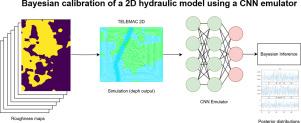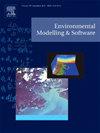基于卷积神经网络仿真器的二维水工模型贝叶斯校正
IF 4.6
2区 环境科学与生态学
Q1 COMPUTER SCIENCE, INTERDISCIPLINARY APPLICATIONS
引用次数: 0
摘要
本研究采用卷积神经网络(cnn)作为TELEMAC-2D的替代仿真器,提出了二维水力模型的贝叶斯校准框架。该方法应用于秘鲁北部的Piura河下游流域,在考虑结构模型误差的情况下,估计了曼宁粗糙度系数的空间分布。在模拟集合上训练的CNN预测了不同粗糙情况下的洪水深度,从而节省了大量的计算量。仿真器嵌入在贝叶斯推理方案中,采用高斯过程差异模型捕获系统偏差。通过综合场景验证,可以在水力敏感区域实现精确的粗糙度检索。此外,使用秘鲁航天局(CONIDA)运营的高分辨率地球观测卫星PeruSAT-1进行了实际案例验证,该卫星在2017年4月10日洪水期间获得。这证实了该框架能够在数据稀缺的情况下再现观察到的深度模式。该方法为传统验证方法仍然有限的洪水易发地区的参数推断提供了可扩展的解决方案。本文章由计算机程序翻译,如有差异,请以英文原文为准。

Bayesian calibration of a 2D hydraulic model using a convolutional neural network emulator
This study presents a Bayesian calibration framework for 2D hydraulic models using convolutional neural networks (CNNs) as surrogate emulators of TELEMAC-2D. Applied to the Lower Piura River Basin in northern Peru, the method estimates spatially distributed Manning’s roughness coefficients while accounting for structural model error. A CNN trained on a simulation ensemble predicts flood depth under varying roughness scenarios, enabling substantial computational savings. The emulator is embedded in a Bayesian inference scheme with a Gaussian Process discrepancy model to capture systematic deviations. Validation with synthetic scenarios demonstrates accurate roughness retrieval in hydraulically sensitive areas. Additionally, a real-case validation was performed using PeruSAT-1, a high-resolution Earth observation satellite operated by the Peruvian Space Agency (CONIDA), acquired during the 04/10/2017 flood. This confirmed the framework’s ability to reproduce observed depth patterns under data scarcity. The method provides a scalable solution for parameter inference in flood-prone regions where conventional validation approaches remain limited.
求助全文
通过发布文献求助,成功后即可免费获取论文全文。
去求助
来源期刊

Environmental Modelling & Software
工程技术-工程:环境
CiteScore
9.30
自引率
8.20%
发文量
241
审稿时长
60 days
期刊介绍:
Environmental Modelling & Software publishes contributions, in the form of research articles, reviews and short communications, on recent advances in environmental modelling and/or software. The aim is to improve our capacity to represent, understand, predict or manage the behaviour of environmental systems at all practical scales, and to communicate those improvements to a wide scientific and professional audience.
 求助内容:
求助内容: 应助结果提醒方式:
应助结果提醒方式:


